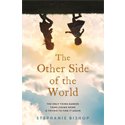 IN BRIEF:
IN BRIEF:
In poetic prose, Stephanie Bishop tells the story of artist, Charlotte, and her poetry-loving husband, Henry, and their search for belonging in Australia, amid the torment of nostalgia for their true ‘home’.
Details, details:
ISBN: 9780733633782
Publication date: 30 Jun 2015
Page count: 352
Publisher: Hachette Australia
The Plot:
British artist, Charlotte, is drowning in new motherhood, physically and emotionally exhausted by the demands of her two children, born less than a year apart.
As another flu-ridden English winter bears down on them, Charlotte’s husband, Henry, pushes for a move to the sunny climes of Australia. Too tired to fight, Charlotte tacitly agrees, despite her deep, almost spiritual connection to the landscape of her homeland.
‘It is as if the place has chosen her. The leaves on the popular trees are flickering: silvery in the wind. Storm clouds gather in the distance. She painted this once, a fen storm, wrapped in her black coat, her easel set up in the mud of the field. The clouds were tinged with purples, slouching diagonally down toward the hill. Roiling, Henry called it. Between the hill and the clouds a yellowish sky glowed.’
Despite her obvious love of her homeland, Charlotte reluctantly goes ahead with the move, travelling by boat with her husband and two children to Perth, where the Indian-born, Henry, has secured a job as a poetry lecturer at a local university.
But Charlotte is deeply unhappy in the strange, new land, and when Henry returns to India to visit his dying mother, Charlotte makes a decision that will change her family’s lives forever.
Thoughts:
As I approach a certain age, one that has a zero in it, I find myself more and more taken back to the past. Mostly to my teenage years when I was constantly yearning for romantic love, and a big career.
It was a period of life in which potential and possibility were absolutely immense.
This is the way I have always viewed nostalgia – as a kind of indulgently benign view of the past.
That was, until I read The Other Side of the World.
In this beautifully written tale of longing and disappointment, Stephanie Bishop puts forward a very different thesis on the meaning of nostalgia, flagged from the opening quotation from Svetlana Boym , who describes it as both ‘a romance with one’s own fantasy’ but also ‘a sentiment of loss and displacement.’
For the artistic Charlotte, the move to the too-hot, and too-bright environs of Perth evokes gut-wrenching feelings of melancholic nostalgia; she longs for the English fields, in the way a mother longs for a child.
‘She does not feel sad so much as unearthed, un-real. Un-existent.’
For Henry, Australia is a failed experiment in his never-ending search for ‘home’. Half-Indian, half-British, he lives between cultures, and his hopes of finding tolerance and welcome in 1960s Australia are dashed.
‘It is not a bad place. But it is not quite what Henry thought it would be. It is not the free place he was promised. There is freedom looking up into the sky, and when he tends the vegetable garden, or plays with his children, but not everywhere. He should have seen this coming.’
Bishops’s evocations of both the English and Australian landscape are lyrical and visceral. When Charlotte arrives in Perth, she describes the strangeness of it all – ‘the wide streets, the cloudless sky, the way the leaves hang lank on the trees.’ All so different to the ‘acres of open space’ of the English fields she knows and loves.
But one leaves this novel with the sense that it is perhaps not a place for which Charlotte yearns, it is for her life before children.
It is in becoming a mother that Charlotte has truly lost her sense of self, and Bishop captures in excruciatingly accurate detail the way in Charlotte’s children evoke feelings of claustrophobia in their mother.
‘They are so small, Charlotte thinks, holding one child and looking down at the other. Tiny. In her mind they seem so large, simply because they take up the whole of it.’
Ultimately, for Charlotte and Henry, nostalgia is not a benign indulgence; it is a torment that prevents them from fully participating in the present. It is an impossible longing for the past – a kind of statelessness – the enemy of mindfulness.
So now, when I look back on my teenage years, I think not just of the tremendous excitement of having all of life ahead of me, I try to remember the awkwardness, the fear, the anxiety and vulnerability of it all.
Besides, I have learned what Charlotte ultimately learns. You can go back to a place where you were happy, but you cannot go back to the person you were in that place.
 The author:
The author:
Stephanie Bishop’s first novel was The Singing, for which she was named one of the SYDNEY MORNING HERALD’s Best Young Australian Novelists.The Singing was also highly commended for the Kathleen Mitchell Award. This, her second novel, was recently shortlisted for the 2014 Australian/Vogel’s Literary Award under the title Dream England.
Stephanie’s fiction and poetry have appeared in SOUTHERLY, OVERLAND and ISLAND and she is a frequent contributor to THE TIMES LITERARY SUPPLEMENT, THE AUSTRALIAN, THE SYDNEY REVIEW OF BOOKS, THE AUSTRALIAN BOOK REVIEW and the SYDNEY MORNING HERALD
Read an extract from The Other Side of the World here or visit Hachette Australia to purchase the book.
*Review copy supplied by the publisher on request

A beautifully articulated review, though I didn’t appreciate the story in the same way you did,